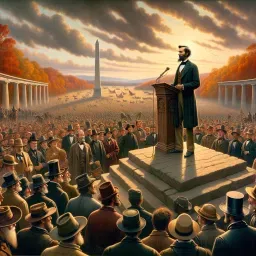”Patience and perseverance have a magical effect before
which difficulties disappear and obstacles vanish“

0
0
0
0
- Meaning
- This phrase suggests that patience and perseverance are almost magical tools that can make difficulties and obstacles seem to disappear. By steadily working through challenges and not giving up, one can overcome even the most daunting problems. It highlights the effectiveness of a calm, consistent, and determined mindset in achieving success.
- Allegory
- The rocky mountain represents the obstacles and difficulties one faces in life. The climber, with a serene expression, embodies the virtues of patience and perseverance, essential qualities for overcoming challenges. The glowing light symbolizes the 'magical effect' of these virtues, transforming and diminishing the obstacles in the path. This imagery captures the essence of how consistent effort and a calm, determined approach can lead to success, illustrated by the clear sky signifying the ultimate achievement and freedom.
- Applicability
- In personal life, applying the tenets of patience and perseverance can lead to achieving long-term goals, handling complex projects, or navigating difficult periods. Whether it's studying for a degree, building a career, or improving personal relationships, continually applying effort and staying patient can lead to positive outcomes. In day-to-day activities, it may encourage people to approach problems with a long-term perspective, reducing stress and increasing satisfaction when progress is eventually made.
- Impact
- In culture, society, and history, such phrases have inspired countless individuals to remain steadfast in their efforts. The idea that perseverance leads to success is a key motivational principle in many educational, athletic, and professional settings. This phrase has likely been quoted in speeches, literature, and personal development seminars, emphasizing the timeless nature of its message.
- Historical Context
- This kind of sentiment was prevalent during the 18th and 19th centuries when enlightenment ideals of progress through human effort were widespread. Both John Quincy Adams and John Dryden lived during times when resilience in the face of adversity was a highly regarded virtue, in line with the social and political contexts of their times.
- Criticisms
- Critics might argue that perseverance alone is not always enough to overcome systemic obstacles or injustices. The saying might be seen as overly simplistic in the face of complex real-world issues where patience and perseverance might not lead to success due to factors beyond individual control, like structural inequalities.
- Variations
- Variations of this phrase might be found in different cultural contexts emphasizing the virtues of hard work and steadfastness. For example, in Japanese culture, the proverb "Nanakorobi yaoki" means "Fall down seven times, get up eight," illustrating a similar message of resilience and persistence.
-

It is a damn poor mind indeed which can't think of at least two ways to spell any word.
-

National honor is national property of the highest value.
-

Fourscore and seven years ago our fathers brought forth on this continent, a new nation, conceived in Liberty, and dedicated to the proposition that all men are created equal.
-

All's well that ends well.
-

It is easier to do a job right than to explain why you didn't.
-

They stumble that run fast.
-

A pound of pluck is worth a ton of luck.
-

How poor are they that have not patience! What wound did ever heal but by degrees?
-

Actions speak louder than words.
No Comments